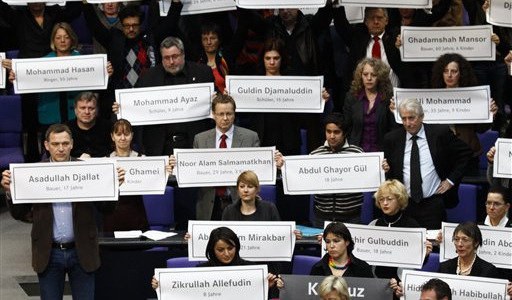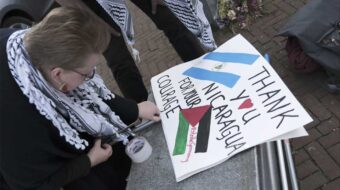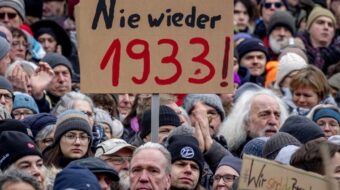
BERLIN – There was unusual excitement in the otherwise so dignified Bundestag on February 26. Of course, everyone knew the Afghanistan extension bill would pass. The ruling parties, Angela Merkel’s Christian Democrats and their right-wing Free Democrat (FDP) partners, had a majority. Add on the Social Democrats. True, they were now in the opposition, but in such questions a very loyal opposition. After all, sending troops and planes to Afghanistan had begun when they headed the government. Their slogan at the time: Germany’s security must be defended at the Hindu Kush mountains. As for the Greens, they had also been in the government then and were thus equally responsible for doing battle 3,000 miles away, in renewed defiance of the German constitution restricting the armed forces to the home country. But many had become uneasy. How would it go?
The planned extension, for one year, meant sending 800 more troops, thus raising the number of Germans in uniform to 5,350, fewer than U.S. generals had called for, and still limited to northern Afghanistan. But it involved many more thousands at home and abroad, cost billions, and represented one more precedent for using military force in far-off lands with deaths and injuries for Germans and Afghans. Where and when would it end? What new countries would require troops to either defend freedom, or women’s rights, or democracy or, less publicly, strategic and economic advantages and prestige for military brass hats only too eager to show their mettle, test their weapons, and win some bright new medals in the long tradition many of them clearly admired.
Despite the obvious odds, the fight against the extension seemed important to its opponents. One tragic event strengthened their resolve. On September 4 last year, near Kunduz, a German colonel ordered the bombing of two gasoline-filled tank trucks seized by Taliban forces but then mired in the sand at a river crossing. The colonel called in an American plane to bomb the trucks without the usual warning for the people clustered near the trucks. The explosion killed over 140 people, many of them civilians, not a few of them children. The military and then the government tried to cover up the extent of this disaster, but item by item it leaked out to the public.
A majority of Germans had not been convinced by the media that their troops in Afghanistan were beneficial to anyone or were helping to keep terrorists out of Germany. On the contrary, they heightened the danger. The Kabul government was viewed as corrupt, the warlords powerful. Dead and wounded German soldiers, though not yet numerous, increased the doubts, and the disaster at Kunduz helped explain why about 70 percent in Germany wanted out. Those circulating petitions against the war found almost no one supporting it.
On February 20, a week before the vote, people came to Berlin from all over Germany to demand a No vote. More had been expected – a strong mobilization a week earlier had successfully prevented a Nazi march in Dresden to there but had cost immense energy among left-wingers and many were simply tired out. It was a good march all the same, it was generally agreed, with people from a wide variety of organizations bringing lots of color to wintry Unter den Linden boulevard, the Brandenburg Gate and the Reichstag building. The big news that day was that the Labor Party in the Netherlands, its Social Democratic party, had quit the government in protest at keeping Dutch troops in Afghanistan. Could that win over some in the equivalent German party, despite its leaders? And what about the Greens? The pressure from their antiwar grass roots was always strong.
The debate started with a bang. The entire fraction of Die Linke, the Left Party, stood up quietly as most of them unfolded signs, each with the black-bordered name of one of the Afghanis killed at Kunduz. Briefly there was shocked silence, but then the session chairman, a man from the Christian Democrats, ordered the whole delegation to leave the chamber, the first time this has ever happened. They filed out quietly, but they had stolen the show. This was something the media could not ignore!
The other parties and the media fumed and scolded. One leading Social Democrat said the Linke should have obeyed long-standing rules and stated their views in a normal speech during the debate. But experience had shown: the TV news and other media would have quoted an obligatory half sentence or so and given the rest of the time to the other parties. In this way the Linke got scolded and lost its chance to make a speech but made its point instead. It argued that the lives of many civilians were worth more than parliamentary rules.
The chairman, more than aware of popular feelings about the war, then got the approval of the other parties to let the Linke come back in to take part in the vote.
This was almost an anti-climax. Two Christian Democrats had the courage to buck the very strong party discipline which rules the Bundestag – 226 voted Yes. Only one FDP man voted No, three abstained, seven didn’t vote at all, the other 82 voted Yes. As for the Social Democrats, after the party spokesman dramatically insisted that the increase was only for one year and “we’ll be watching carefully,” 113 ignored the Dutch rebellion and voted tamely Yes. Sixteen Social Democrats had the courage to vote No, eight abstained, nine refrained from voting. This was no big improvement but it was an improvement.
As for the Greens, eight voted to extend, 21 voted No, 35 abstained and four didn’t vote. In other words, they were split as usual.
As for the Linke: 71, all those who were present, voted No! This was, after all, a central plank in their program.
The sum: 429 Yes, 111 No, with 46 abstentions. A better result than in earlier votes, but in no way representative of the wishes of the people. That’s nothing new, but is reflected in the growing unpopularity of the present government.
Photo: During the Bundestag debate, Feb. 26, German Linke (Left) Party Parliament members hold signs with the names of victims of a September 2009 bombing near Kunduz, Afghanistan. (AP /Michele Tantussi)











Comments